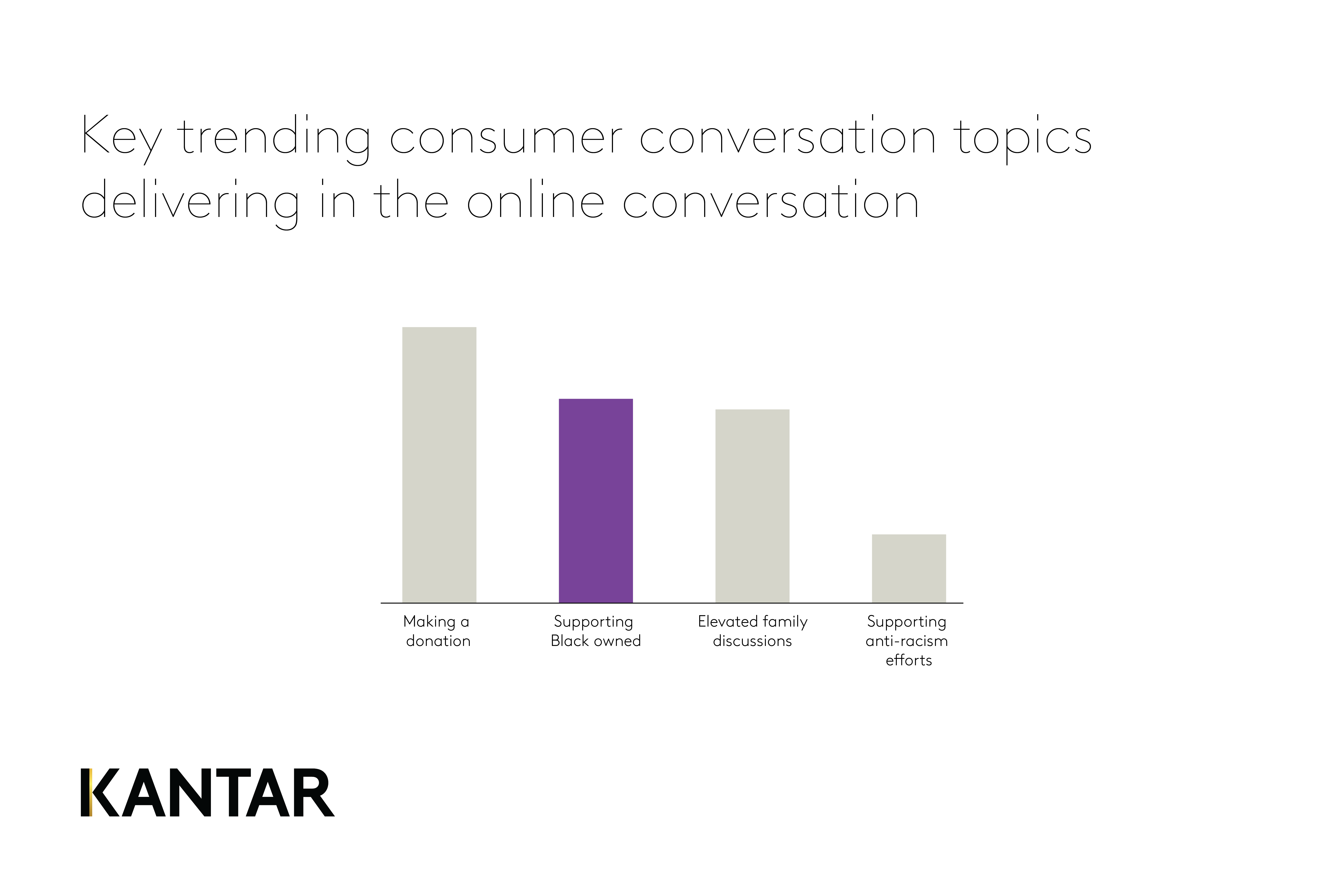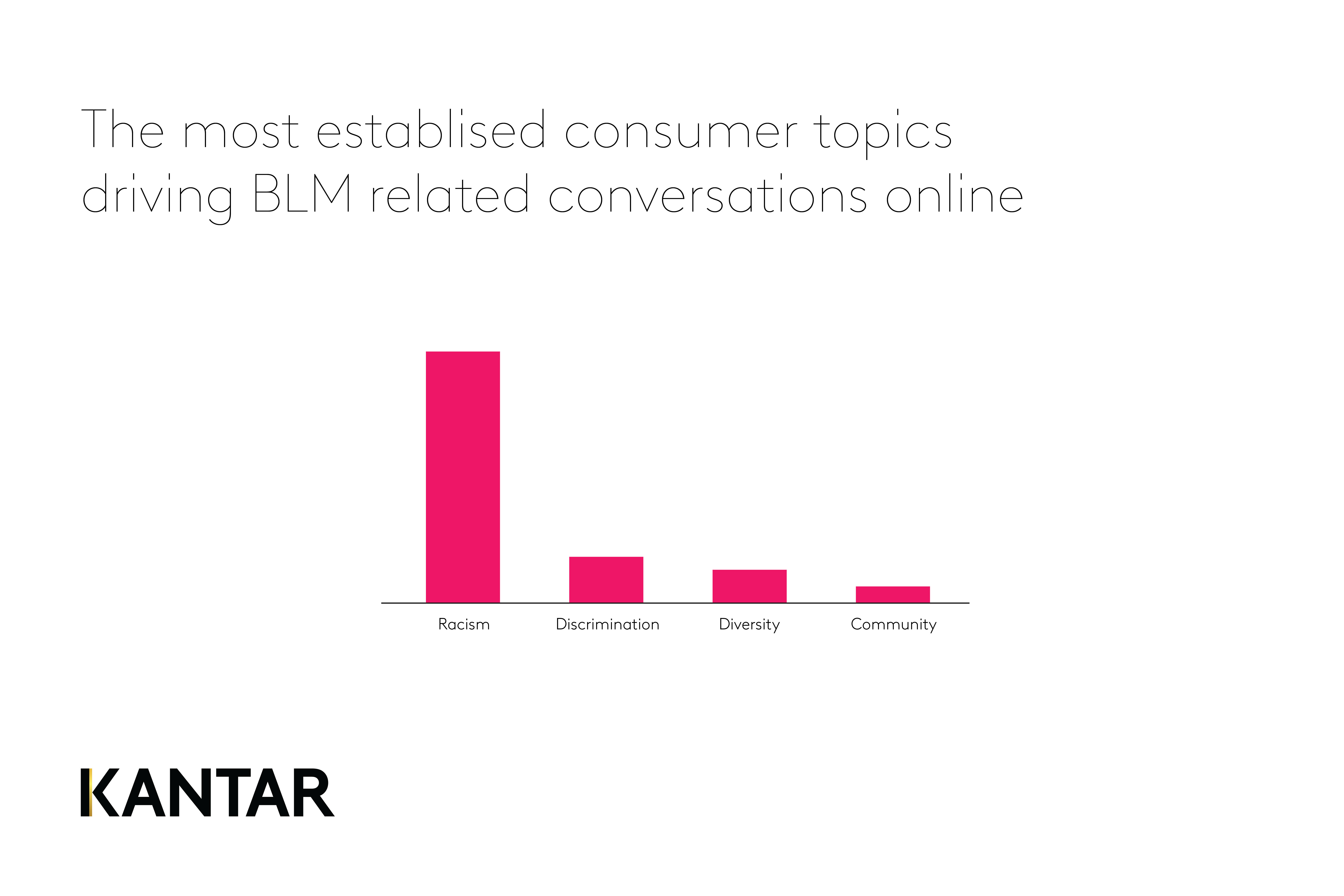American consumers are increasingly looking to the brands they know and love to take a stand on important social causes. Many brands have answered the call to get themselves on the right side of history, but the role brands can play and their level of involvement in social causes is a subject of considerable debate among the industry and consumers alike.
The evolution of 'civil social media' -- moving away from posting solely fun and light moments in favor of online activation around movements and community issues -- has steadily gained momentum over the last decade. We witnessed the Arab Spring in 2010, the #metoo movement in 2017 and, most recently, the rise of Black Lives Matter. In light of this and growing consumer expectations, brands will need to consider where they fit in. One thing that has been made clear over the last several years is that the worlds of advertising and marketing are acknowledging the responsibility brands have to support the social causes that matter to consumers.
What do consumers want from brands when it comes to social causes?
Kantar research focused on understanding what really matters to consumers, and what is likely to matter more in the future in the areas of social justice and human rights. Kantar's starting point for examination: which values and actions matter to consumers today and what is likely to disrupt tomorrow?
After conducting contextual research in preparation, Kantar selected 17 personal values (including improvement, fairness, equality, energy, inspiring) and 15 actions (including donations, boycotts, employee support) and used Kantar's artificial intelligence analytics tools to identify disruptive trends related to values. We did this by analyzing more than 1.5 million consumer conversations in the U.S. over the last two years.
It is important to mention that when Kantar looked at rising trends, we assessed the growth and momentum of each. This meant understanding both its velocity (how fast its growing) and crowd (how much backing they are gaining over time). Kantar found consumer demand for values showing momentum including bravery and improvement, while actions such as donations, supporting black-owned and anti-racism are likely to disrupt. Some of the brands that we saw gaining positive momentum in online conversations during 2020 included Ben & Jerry's, Adidas, Verizon, and Old Navy. So what can brands do?

Support small businesses
Help Black-owned or minority-owned businesses to succeed. Make it easy for consumers and the local community to help and contribute. When we looked at consumer conversations, the common theme was not only about the support provided to these businesses, but also the positive energy put behind that support, indicating that consumers expect passionate results-driven approaches.

For example, UberEATS showed a strong lead amongst the companies resonating with consumers in this area, but consumers also talked about alternative local brands that are Black-owned (like Miiriya). The winning brands initiatives include waving delivery fees for Black-owned restaurants and spotlights on Black-owned businesses relatively. Some consumers said:
"Uber Eats is doing the right thing by showing solidarity with Black Americans who are victimized by systematic anti-Black racism, by waiving delivery fees for Black owned restaurants"
"It’s so so important to support small businesses, especially black owned, and this app makes it so easy that there’s no excuse not to"
"This website (Miiriya) is like Amazon but for Black businesses only, you can conveniently shop black-owned businesses in one place, let's put our energy in something like this, they're new please give them a follow and your support"
Have brave conversations
Bravery is not a tactic or strategy. It's an attitude expressed through habits and behaviors. Any communication made within this space needs to align with the history of your brand, your brand's values, and how they appear within your organization, otherwise it can face backlash. In this space, consumer conversations referenced bravery in the context of racism, community and family, along with companies such as Nike, Apple and Facebook.
It appears in 2021 that consumers expect brands to "go big or go home," speaking out loud and clear. Examples in this area include Nike's 'For Once Don’t Do It' campaign; the video reads "Don’t pretend there's not a problem in America. Don't turn your back on racism. Don't accept innocent lives being taken from us. Don't make any more excuses. Don't think this doesn't affect you. Don't sit back and be silent. Don't think you can't be part of the change. Let's all be part of the change." The video has more than 5 million views on Instagram and netizens have commended the brand for speaking out. Nike has also posted the video on Twitter (where it was then retweeted by Adidas).
Ben & Jerry's has stopped posting sanitized statements and is making bolder direct statements like 'We must dismantle white supremacy.' They are also committing to the cause by actively calling for political engagement from US citizens.
Commit to diversity and "do better"
When it comes to improvement, consumer interest in diversity and donations to advance the issue are gaining momentum. From a consumer point of view, this value appears to be linked to bringing about peace, equality and justice. Brands being talked about in this space include tech giants Google, Apple and Facebook. Google for example, has recently appointed Jewel Burks Solomon as head of Google for Startups and dedicated $5 million to BlackTech founders through Google Startups.
"@jewelmelanie @GoogleStartups @Google This is a perfect fit. Glad to see @GoogleStartups adding leadership who will improve diversity within the tech world. Kudos and wishing you excellent success in your new role"
"Beyond all the negative stories and trolling these days, there's still good news outchea, like today's @GoogleStartups + @goodienation announcement of $5M in cash awards to #BlackTech founders"
Online U.S. consumers widely applauded Nike's effort to support Colin Kaepernick. Consumers celebrated Nike products, linking them positively to the support and energy embodied by the brand. Nike communications putting energy and showing support through its products widely resonated in the community. A notable example of a brand supporting diversity efforts through its products and what they represent all momentously noticed by U.S. consumers.
Finding the role for brands: An ear to the consumers' attitudes and ongoing popular conversations through AI/ML analytics
While some brands are effectively leading and responding to consumers' growing desire for them to become agents of positive change, others are shying away as well as receiving backlash for their efforts. Our research indicated demand by consumers for brands spearheading change and earning acceptance requires a bold and authentic voice, internal practices that are reflective of external messaging, dedicated human and financial resources, a willingness to do things without a list of best practices, and a desire to learn and receive cultural trends.
Deeply understanding cultural trends and changing consumer needs are a good place to start when fulfilling a brand's duty on social justice. It may sound obvious, but having an ear to the ground to hear the raw and unedited consumer attitudes, used to be not only costly, but difficult to extract due to the sheer volume of data – the many social causes, stakeholders, values and changing context – so it was challenging for marketers to truly get it right.
With improved technology, that massive volume of data that was once a challenge is now an asset. Ease of access to consumer online conversation over time, allows us to have a robust read into what consumers want, how they want it and why they want it when it comes to the social causes of importance to them and the values they represent.
Duty calls, what’s your plan to be brave?
Yes, we are a country of more than 340 million people, we won't all get along. Now more than ever brands must strive to go deeper and understand the scope and context of how consumers will react to the important social justice issues and act. We know that disruptive values in this space include improvement through diversity and bringing about ‘bravery’ in our organizations.
Within the context we live today and other issues such as mental health, evolving identity boundaries and a blur between the offline and online world taking precedent, it is more important than ever to listen to the consumer and get behind consumer causes that are meaningful. More importantly, we need individuals at every level in the organization to take leadership and act, be brave, be humble and improve. As a consumer said recently online, "make it so easy that there is no excuse not to get involved."


